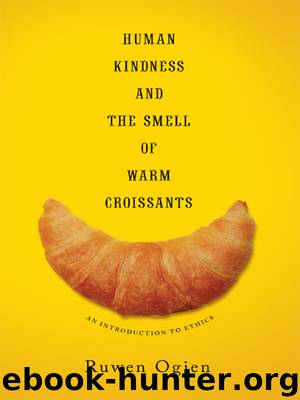Human Kindness and the Smell of Warm Croissants by Thom Martin Ogien Ruwen

Author:Thom, Martin, Ogien, Ruwen
Language: eng
Format: epub
Tags: PHI005000, Philosophy/Ethics and Moral Philosophy, PHI027000, Philosophy/Movements/Deconstruction
Publisher: Columbia University Press
Published: 2015-05-18T16:00:00+00:00
16
AND IF SEXUALITY WERE FREE?
What would a world in which sexuality were free be like?
We put our capacities to give sexual pleasure at the disposal of others instead of keeping them for ourselves. Why?
The answer is not obvious. Sex is no bed of roses. It is an activity that has a certain psychological, physical, and even economic cost.
It is because these costs of sex are well known that we can very well understand those who prefer to watch a football match on the television or to cut their toenails.
Evolutionists tell us that there exist instinctive causes, tied to the interests of the species, informing our tendency to engage in activities whose individual benefits are not obvious.
But we do not always follow our instincts and, in any case, the question that might come under the competence of the philosopher does not have to do with causes (the province of the biologist) but with reasons.
More precisely, it is the question of knowing whether such reasons are good and legitimate.
What then are the reasons why we put our capacities to give sexual pleasure at the disposal of others instead of keeping them for ourselves?
Sex may follow the logic of exchange, because there is something to be gained in return: love, gratitude, sexual pleasure, admiration for our beauty or our talents in bed, children, a partner for life, money, a helping hand when moving houses or redecorating our apartment, and so on.
But sex may also follow the logic of the gift, and there may therefore be no expectation of anything specific in return, not even sexual pleasure: because we love absolutely just as we can love God or a star, because we wish to give all that we possess, because we have the feeling that it is our duty, because we are completely infatuated physically or morally, and so on.1
In sum, there exist an infinity of reasons for putting our capacities for giving sexual pleasure at the disposal of others.
Is it legitimate to hierarchize them, to judge that certain reasons are good and others bad?
Aside from a few cynics, no one denies that love can be a good reason for engaging in a sexual relationship. But it is neither the only reason, nor necessarily the best one. Why sacralize it, as some do? Why accord it such a moral privilege?
Is it really tawdrier to use our sexual capacities to fund a weekend in Capri?
What would happen in a world in which sexuality was truly free?
In such a world, the reasons for putting our capacities for giving sexual pleasure at the disposal of others would no longer be hierarchized. We would cease to think that some are noble and others ignoble.
Sexual activities would escape not only penal repression (we would do what we wished with our sexual life so long as we caused no harm to others) but also moral intervention (there would no longer be any bad reasons for putting our sexual capacities to a particular use). It would be a world in which sexuality would at last be freed from moral and political paternalism.
Download
This site does not store any files on its server. We only index and link to content provided by other sites. Please contact the content providers to delete copyright contents if any and email us, we'll remove relevant links or contents immediately.
| Deconstruction | Existentialism |
| Humanism | Phenomenology |
| Pragmatism | Rationalism |
| Structuralism | Transcendentalism |
| Utilitarianism |
The remains of the day by Kazuo Ishiguro(7551)
Tools of Titans by Timothy Ferriss(6947)
The Black Swan by Nassim Nicholas Taleb(6192)
Inner Engineering: A Yogi's Guide to Joy by Sadhguru(5897)
Giovanni's Room by James Baldwin(5878)
The Way of Zen by Alan W. Watts(5800)
The Six Wives Of Henry VIII (WOMEN IN HISTORY) by Fraser Antonia(4790)
The Power of Now: A Guide to Spiritual Enlightenment by Eckhart Tolle(4755)
Astrophysics for People in a Hurry by Neil DeGrasse Tyson(4620)
Asking the Right Questions: A Guide to Critical Thinking by M. Neil Browne & Stuart M. Keeley(4576)
12 Rules for Life by Jordan B. Peterson(3734)
The Ethical Slut by Janet W. Hardy(3503)
Skin in the Game by Nassim Nicholas Taleb(3460)
Housekeeping by Marilynne Robinson(3401)
The Art of Happiness by The Dalai Lama(3384)
Double Down (Diary of a Wimpy Kid Book 11) by Jeff Kinney(3272)
Skin in the Game: Hidden Asymmetries in Daily Life by Nassim Nicholas Taleb(3264)
Walking by Henry David Thoreau(3234)
12 Rules for Life: An Antidote to Chaos by Jordan B. Peterson(3203)
